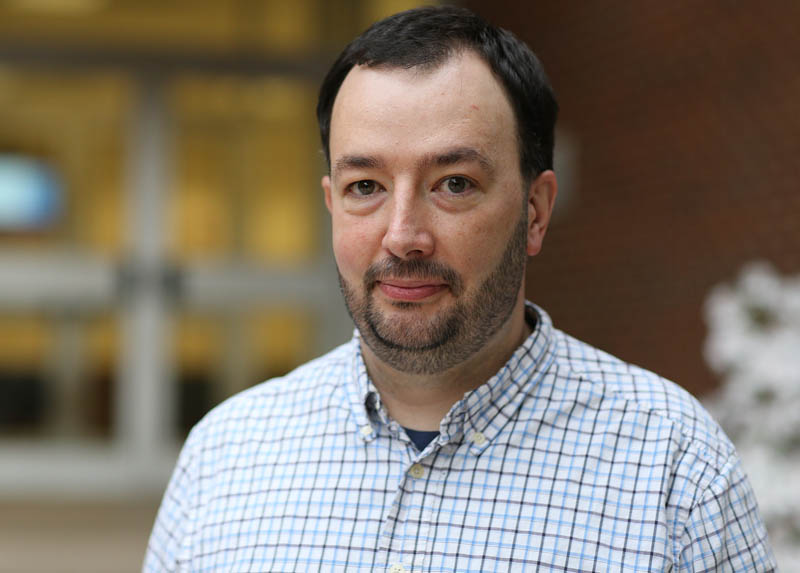Jeff Baker has figured out how to write poetry in just about any situation, whether it’s riding the bus to work or walking home. He either writes or recites into his cell phone.
The process works for Baker, student services and IT generalist for the University of Virginia School of Medicine’s Graduate Programs Office. His first book, “Whoop and Shush,” recently won the Idaho Prize for Poetry and was published by Lost Horse Press.
Given the complexity of creating a good poem, Baker said organizing a database of 60,000 entries is not as daunting.
“Writing a poem starts with making choices, and it’s the same with constructing a database,” said Baker, who has worked at his U.Va. job for about 10 years. You decide what to put in and what to leave out, for instance.
“A poem has moving parts. William Carlos Williams [a poet who was also a physician] called a poem a ‘little machine made out of words,’” Baker said.
Baker grew up on a small tobacco farm in Smokey Branch, Tennessee – a past that sometimes provides material, though he said he avoided it for a long time. Some memories are not particularly pleasant, he said.
College opened new options. Baker went to Tennessee Technological University, where he supported himself by working in factories: chocolate, meat processing, airbags, windshields. Along the way as he majored in psychology and took creative writing classes. His teachers and fellow students were so encouraging, he continued writing poetry and opted to pursue a Master of Fine Arts degree at the Iowa Writers’ Workshop. Iowa gave him time to write, he said.
This was toward the end of the 1990s, when high-tech companies were still booming. Baker decided to build his technology skills to return to work.
After he and his wife, who grew up in Charlottesville and went to Iowa’s fine arts program for painting, moved to this area, he worked at Boxer Learning, and then took the job at U.Va.
One of his main projects in the Graduate Programs Office is coordinating the Summer Research Internship Program, which has grown to become a large and complex endeavor encompassing more than 700 applications per year for about 35 positions in a 10-week summer biomedical research experience with more than 175 participating U.Va. faculty. For his efforts, Baker received a Leonard W. Sandridge Outstanding Contribution Award last year.
Carol Ann Tomlinson, William Clay Parrish Jr. Professor and chair of Educational Leadership, Foundations and Policy in the Curry School of Education, has never met Baker, but noticed his poetry.
“[I] have read the book and am fascinated by the multi-facetedness of someone who excels in a highly technical field by day and writes really complex poetry in the margins of his time,” she wrote in an email.
Baker’s poems have been published widely in literary journals and in several anthologies, including “Best New Poets of 2010” and “The Southern Poetry Anthology, Vol. VI: Tennessee.”
The Idaho Prize is an annual, national competition for a winning poetry manuscript that comes with a $1,000 award and publication by Lost Horse Press, an independent publisher located in Sandpoint, Idaho.
The poet Dorianne Laux, this year’s judge for the Idaho Prize, wrote: “Under the spell of the language and its restless repetitions and rhythms, these poems surprise with unexpected turns and shifts, associations and speculations. Jeff Baker reminds us that it is words that beget the whoop and shush of worlds, and sing us back into the strangeness of being.”
An excerpt from “Season”
“Whoop and shush, whoop and shush.
He’d whipped the pregnant mare into
crossing low ground where three hills
shunted their runoff and she’d keeled
onto her side trapping his leg beneath her
in the bog. The whoop, which frightened
the mare, for someone to find him.
She’d then try to lift her head and right
herself, causing her rounded barrel
to torque against the trapped leg.
Therefore, the shush, which calmed
her head back down to the mud.”
Media Contact
Article Information
March 26, 2015
/content/it-manager-writes-prize-winning-poems-while-riding-bus

